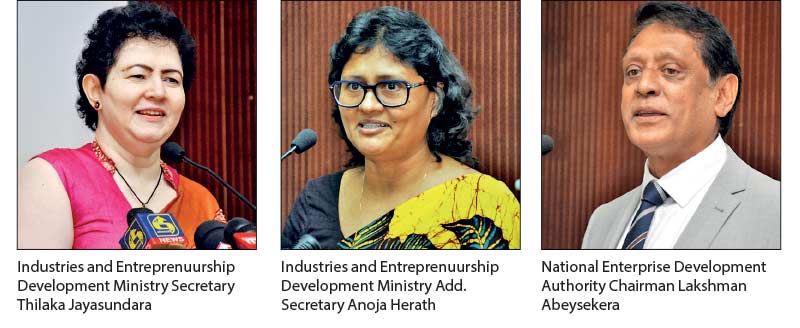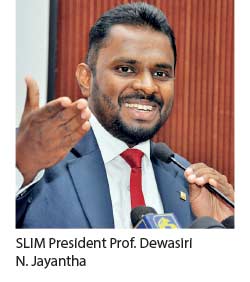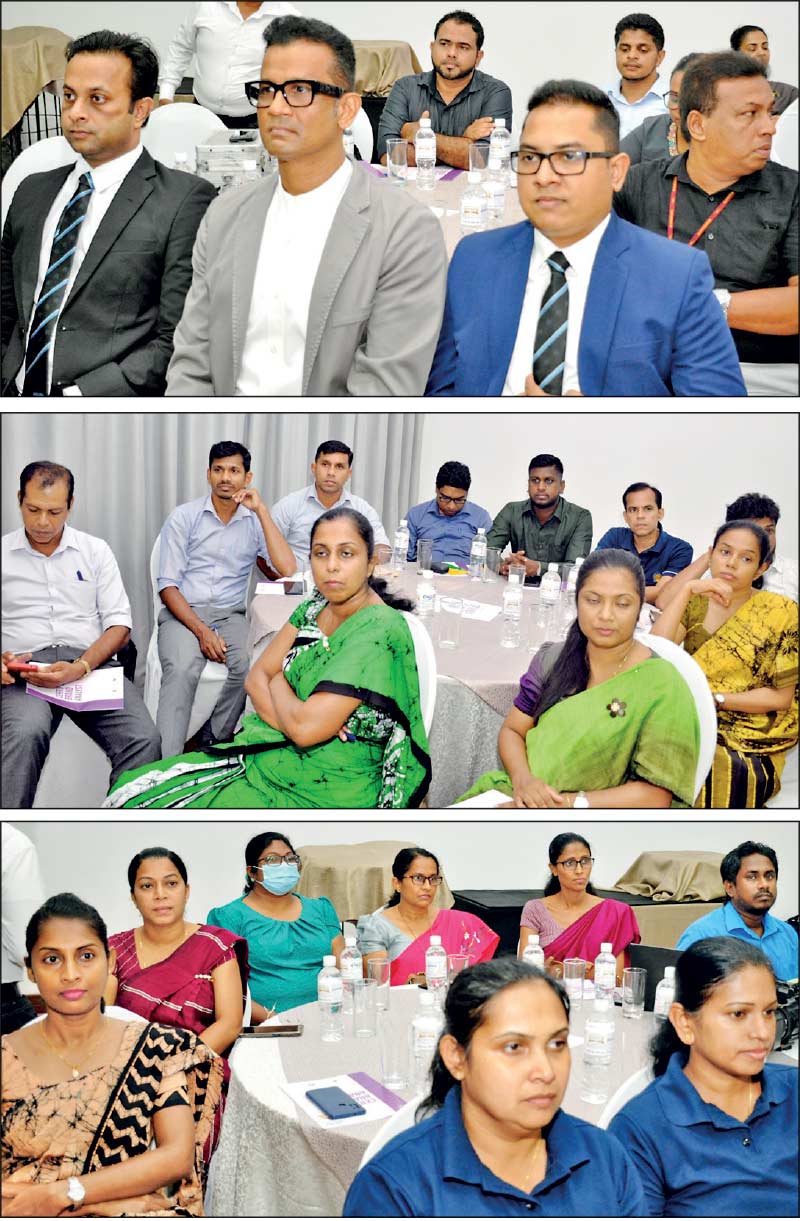Monday Feb 23, 2026
Monday Feb 23, 2026
Thursday, 9 October 2025 00:30 - - {{hitsCtrl.values.hits}}

By Safna Malik
 The National Enterprise Development Authority (NEDA), in collaboration with the Sri Lanka Institute of Marketing (SLIM), has officially launched the Certified Brand Analyst Program 2025.
The National Enterprise Development Authority (NEDA), in collaboration with the Sri Lanka Institute of Marketing (SLIM), has officially launched the Certified Brand Analyst Program 2025.
The program, a joint effort with the Industry and Entrepreneurship Development Ministry, is designed to enhance the skills of Enterprise Development Officers (EDOs), enabling them to guide small and medium-sized enterprises (SMEs) in creating globally recognised brands. The initiative’s goal is to foster a new generation of brand creators within the Government.
Industry and Entrepreneurship Development Ministry Secretary Thilaka Jayasundara introduced the strategic concept of “branding the Industry Family.” She emphasised that all key partners and entities under the ministry’s umbrella must work together, asserting that a unified vision and a collective effort are crucial for success, as no organisation can reach its full potential alone.
Using “Clean Sri Lanka” as a national initiative, Jayasundara stated that its primary objective goes beyond merely cleaning streets; it’s about cleansing the mind-sets of the Sri Lankan people. She detailed the initiative’s three pillars as economic, social, and environmental. She emphasised that a clean environment is a direct result of building a strong economy and social structure.
She explained these pillars, support several key national targets set for 2030, all focused on building a manufacturing-led economy. Jayasundara said the first goal is to boost the manufacturing sector’s contribution to GDP from its current 16.2% to 20% by 2030. She said it is essential for reaching the broader national target of increasing the country’s overall GDP from 26.7% to 28% by 2030, which would pave the way for a “rich country and a beautiful life for all” by 2028.
She shared the second goal as boosting entrepreneurship. Jayasundara noted that only 3.2% of the national labour force are entrepreneurs. To increase this contribution to at least 10% by 2030 is a challenging but necessary task. To ensure stability, she also outlined a series of ambitious financial targets. The ministry is aiming for a foreign income of $ 15 billion and a total import and export income of $ 28 billion by 2028, with a further national target of $ 36 billion by 2030. A failure to meet these goals, she warned could lead to economic instability due to the country’s debt obligations.
Jayasundara also highlighted the remarkable resilience of Sri Lanka’s apparel sector. She noted that despite global trade challenges, total exports for the first seven months of 2025 reached an impressive $ 9,992.53 million, marking a robust 7.79% growth over the previous year. To sustain this drive, she urged the industry to proactively identify and target new global markets, specifically pointing to South Africa and the Gulf countries as untapped and massive opportunities.
She outlined that a key objective of the ministry is to develop high-potential, export-led industries, diversifying the export basket, and increasing the number of export countries. Addressing the motivation behind the new specialised initiative, Jayasundara explained that the ultimate goal is to create a powerful export brand for Sri Lanka. She assured that the new program will enhance the quality of officers and that the ministry plans to introduce a KPI-based incentive system to drive results.
Jayasundara then outlined three crucial elements for this initiative: “Brand,” “Certificate,” and “Communication.” She argued that both entrepreneurs and public officers must build their own personal brands to be effective; the certificate is designed to enhance the quality of participants and provide a formal qualification; and communication is vital for an initiative to succeed.
She also spoke of a long-term vision to unify the industry by merging NEDA, SED, and IDB, a plan first conceived in 2016. She expressed her belief that the SLIM institute would eventually join this collaborative framework, suggesting that these partnerships are essential for creating a national industrial brand.
SLIM President Prof. Dewasiri N. Jayantha then reflected on Sri Lanka’s economic history, noting that the country once had its own global brands, citing the Upali Group and its ventures as prime examples. He argued that a shift from an export-oriented model to import-driven consumption led to the significant depreciation of the Sri Lankan rupee and consistently negative balance of trade, which he identified as the beginning of the nation’s economic challenges.
He asserted that the 2022 national crisis finally “opened the eyes” of the Government and private sector to the failure of this economic model. Despite being a 55-year-old institution, he acknowledge that SLIM couldn’t fully achieve its vision “to drive the nation towards economic prosperity.” To rectify this, the organisation has identified entrepreneurship and the development of SMEs as its core pillars and has decided to invest heavily in a multi-tiered series of programs, with an initial estimate of 300 million Sri Lankan rupees to train 1,800 individuals. He clarified that this is not a profit-based venture for SLIM, but a fulfilment of its social and institutional responsibility.
He detailed the new training program, designed to create a “supportive arm” of skilled professionals. The program starts with the Relationship Officers (RO) Program, training 700 individuals, 500 of whom will become Relationship Specialists. The Brand Analyst Program, a 10-week program, will train 100 individuals. From there, the top 50 will advance to become Certified Brand Strategists, and finally, a Business Consultant Program will train 350 individuals with the goal of creating 100 professional Business Consultants who could potentially earn in “millions.” He also revealed that SLIM is in discussions to link this program to with the Chartered Management Institute located in UK with their Level 7 program, which would provide a globally recognised qualification.
He laid out the Brand Analyst Program curriculum in detail, first to third week: Introduction to branding, differentiating it from products, understanding its importance for SMEs, and focusing on brand elements, identity, and target audience. Fourth to seventh week: Strategic topics like brand positioning, developing a unique selling proposition (USP), and mastering brand storytelling and communication. Eighth to ninth week: Practical lessons on branding tools and techniques for local and export markets, including learning from mistakes and focusing on reputation management. Tenth week: The final “brand camp,” which includes a practical simulation activity: the digital re-launch of a brand.
In addition to the educational content, the program offers a scholarship fund for the top ten performers, a Vietnam tour for the top student, and a compensation or bonus system for participants who achieve their KPIs.
He expressed gratitude for the Australian High Commission’s Sri Lanka Support Division, which will partially fund the program, noting that its outcome-based nature was highly compelling. He reaffirmed that SLIM’s motivation is not profit-driven but rooted in a sense of national responsibility.
He said the ultimate objective is to create 20 to 30 new global brands from Sri Lanka within the next two years, a significant increase from the current “less than a handful.” He thanked all partners for enabling SLIM to be a key participant in this vital national journey.
